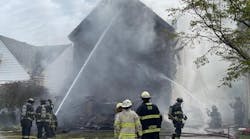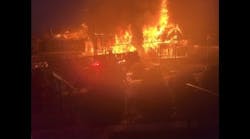April 06--The escalating costs of fighting wildfires is forcing the Forest Service to raid other programs, including fire prevention work, to make up the difference.
Last year, the Forest Service moved $500 million budgeted for other programs to help pay for $1.3 billion in firefighting expenses, according to a report from lawmakers advocating a new system for funding fire suppression.
A move to treat the most destructive, expensive wildfires as natural disasters, funded through a separate budget, would allow the Forest Service and the Department of the Interior to protect the funding for other programs. The idea has some bipartisan support in the House and the Senate and President Barack Obama.
The report was led by Oregon Rep. Peter DeFazio, the ranking Democrat on the House Natural Resources Committee. It found the current system perpetuates a cycle in which the Forest Service can't afford to perform needed fuel-reduction treatments that would lower wildfire risks because it has to spend so much fighting fires.
For example, in 2013, the Forest Service moved $183 million from restoration and $30 million from brush disposal and $30 million from capital improvements and maintenance.
In Central Washington, forest managers say too much fuel has built up in forests of the eastern Cascades after decades of fire suppression policies allowed large amounts of brush and downed wood to accumulate, raising the risks of large, destructive wildfires.
Fuel-reduction treatments, including prescribed burns and hand-thinning, can reduce fire risks, but it's expensive.
The solution pushed by DeFazio and originally introduced by Sen. Ron Wyden, D-Ore., and Sen. Mike Crapo, R-Idaho, would be to treat the most devastating, expensive fires as natural disasters. This would exempt the suppression costs for those fires from agency discretionary spending limits, similar to hurricanes and floods.
The House version of the bill is co-sponsored by 14 Republicans and 11 Democrats, the majority from western states.
The deputy fire officer for the Okanogan-Wentachee National Forest said he couldn't comment on the potential benefits of the bill for this region's forests because it is still under discussion.
Rep. Doc Hastings, R-Pasco, chairman of the House Natural Resource Committee, said in a statement that he agrees the funding system for wildfire suppression is broken. But he believes the best solution is changing forest management through a bill he sponsored to encourage more timber harvests.
"This is a long-term solution to promote healthy forests and responsible timber production, and protect our forests from devastating wildfires," Hastings said in a statement to the Herald-Republic.
Copyright 2014 - Yakima Herald-Republic, Wash.





